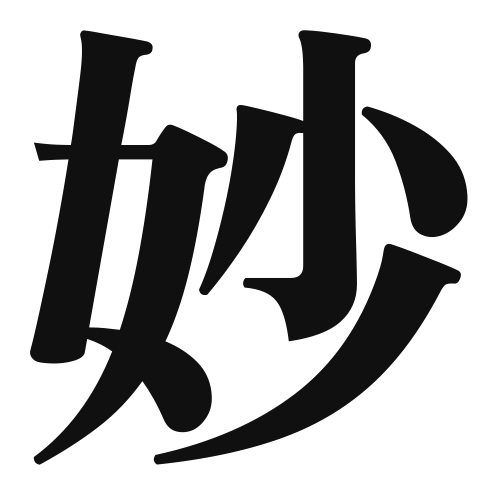1. Overview of Meaning
The kanji “妙” (myou) generally means “wonderful,” “strange,” or “mysterious.” It conveys a sense of something that is both intriguing and extraordinary, often with a hint of the supernatural or the unknown.
2. Formation and Radical
The kanji “妙” is a phonetic-ideographic character (形声文字), which combines both meaning and sound. The left part, “女” (woman), suggests a connection to femininity or beauty, while the right part, “妙” (myou), indicates the sound and adds to the overall meaning of something exquisite or mysterious.
The radical of “妙” is “女,” which is commonly associated with women and femininity in various kanji.
3. Examples of Usage
Common words and phrases that include “妙” are:
- 妙技 (myougi) – “wonderful skill”
- 妙齢 (myourei) – “the age of beauty”
Example sentences in daily conversation:
- この絵はとても妙ですね。 (This painting is very wonderful.)
- 彼女の話はいつも妙で面白い。 (Her stories are always strange and interesting.)
4. Synonyms and Antonyms
Similar kanji with related meanings include:
- 奇 (ki) – “strange” or “odd,” which often has a more negative connotation compared to “妙.”
- 美 (bi) – “beauty,” which emphasizes aesthetic appeal rather than mystery.
Antonyms include:
- 平凡 (heibon) – “ordinary,” which contrasts with the extraordinary nature of “妙.”
5. Cultural and Historical Background
The kanji “妙” has significant ties to Japanese culture, often used in literature and art to describe beauty and mystery. It appears in various proverbs and idiomatic expressions, such as:
- 妙に思う (myou ni omou) – “to find something strange or wonderful.”
In traditional Japanese aesthetics, “妙” reflects the appreciation of the subtle and the mysterious, often found in poetry and visual arts.
